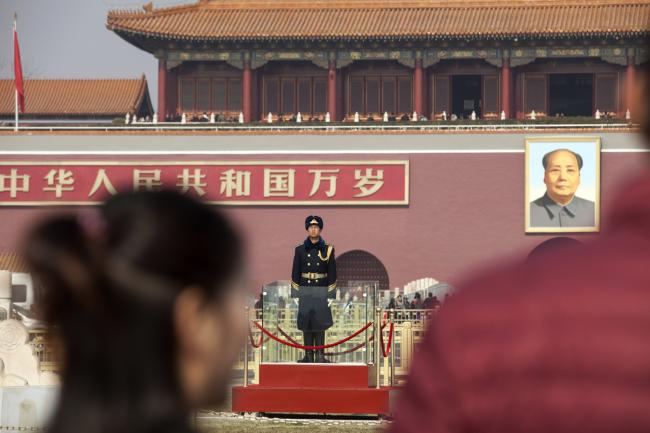(Bloomberg) -- A momentous fortnight for China’s economy begins next week when leaders set policies for the year and detail plans to curb financial risk, air pollution, and excess industrial capacity.
Things kick off Monday morning in Beijing with Premier Li Keqiang’s work report outlining 2018 goals for economic growth, money supply, credit growth, inflation and the fiscal deficit.
Senior appointments, including those for central bank governor and, potentially, chief of a merged financial regulator, will also be announced or discussed at the meeting, providing more fodder for analysts and economists to shape the outlook for the coming year. It all wraps up around two weeks later with Li’s annual press briefing on policy goals.
Click here: Here’s what we know about when a new PBOC chief gets named
The pow-wow comes as concern is creeping into analysts’ views on the economic outlook. Though 2017 outperformed and economists have been upgrading forecasts for this year, Nomura Holdings Inc., Morgan Stanley (NYSE:MS) and State Street Corp (NYSE:STT). have all warned of a slowdown.
Key to watch will be policy targets and economic policy appointments. The report itself is long and detailed: last year’s -- read it here -- ran more than 15,000 words in English.
President Xi Jinping didn’t specify a longer-term growth target at the twice-a-decade Party Congress in October, and policy emphasis has shifted toward quality of growth over quantity. That’s led some to say China should ditch its long-standing practice of setting a numerical growth target in favor of a forecast. But Yang Weimin, an official from the Communist Party committee overseeing economic policy, says targets won’t be abandoned before 2020.
The annual target remains a crucial barometer of official thinking because it shows how policy makers seek to balance competing aims of growth, reform and financial deleveraging, says Shane Oliver, the head of investment strategy at AMP Capital Investors Ltd. in Sydney.
While markets anticipate a target of about 6.5 percent again this year, a wider goal of 6 percent to 7 percent would signal seriousness in reducing financial risk, cutting pollution, and reining in local government finance and excess capacity, says David Loevinger, a former China specialist at the U.S. Treasury.
Market Jitters
There’s a chance markets, which are now sanguine about the growth outlook, may be roiled if the target looks “softer” than usual with greater tolerance for slower growth, Oliver says.
"The growth target will remain extremely important for them because they’re still bound by the 10-year objective of doubling GDP by 2020" Dariusz Kowalczyk, a senior emerging-market strategist at Credit Agricole (PA:CAGR) SA in Hong Kong, said in a Bloomberg Television interview Thursday. "The good thing is this objective requires growth to average only 6.3 percent in the coming three years, so they can afford a weaker growth target."
Li will also unveil objectives for inflation, money supply, aggregate finance and the fiscal balance, and may signal more tightening of debt controls. China plans to reduce its annual budget-deficit target to just under 3 percent of total economic output, Bloomberg reported Tuesday, citing people familiar with the matter.
Banco Bilbao Vizcaya Argentaria SA sees the inflation ceiling remaining at 3 percent. China International Capital Corp. sees the aggregate finance target staying at about 12 percent.
Li may downplay the M2 money supply target, which is becoming less important because it’s less controllable and relevant to the economy as markets and financial products become more complicated, CICC says. January M2 growth of 8.6 percent was far below the target.
Personnel Changes
The new economic policy team is another must watch area, specifically the role for Xi confidant Liu He and Zhou Xiaochuan’s replacement as central bank governor.
Liu is widely expected to become vice premier in charge of the economy, replacing Ma Kai, and lead the Financial Stability and Development Committee overseeing financial regulation. Research firm Trivium China says he also has the inside track to be central bank governor and that banking regulator Guo Shuqing will likely be the PBOC’s party secretary.
A Liu-Guo combination at the central bank would be “a dream team for foreign investors and a nightmare for shadow bankers,” says Loevinger, now an analyst at fund manager TCW Group Inc. in Los Angeles. Hubei provincial party chief Jiang Chaoliang is another contender.
China also is considering a merger of its banking and insurance regulators, Bloomberg has reported, citing people familiar with the matter. Trivium says it likely will be headed by People’s Bank of China Deputy Governor Yi Gang.
(Updates to add strategist comment in 10th paragraph.)
To contact Bloomberg News staff for this story: Kevin Hamlin in Beijing at khamlin@bloomberg.net.
To contact the editors responsible for this story: Jeffrey Black at jblack25@bloomberg.net, Jeff Kearns
©2018 Bloomberg L.P.
